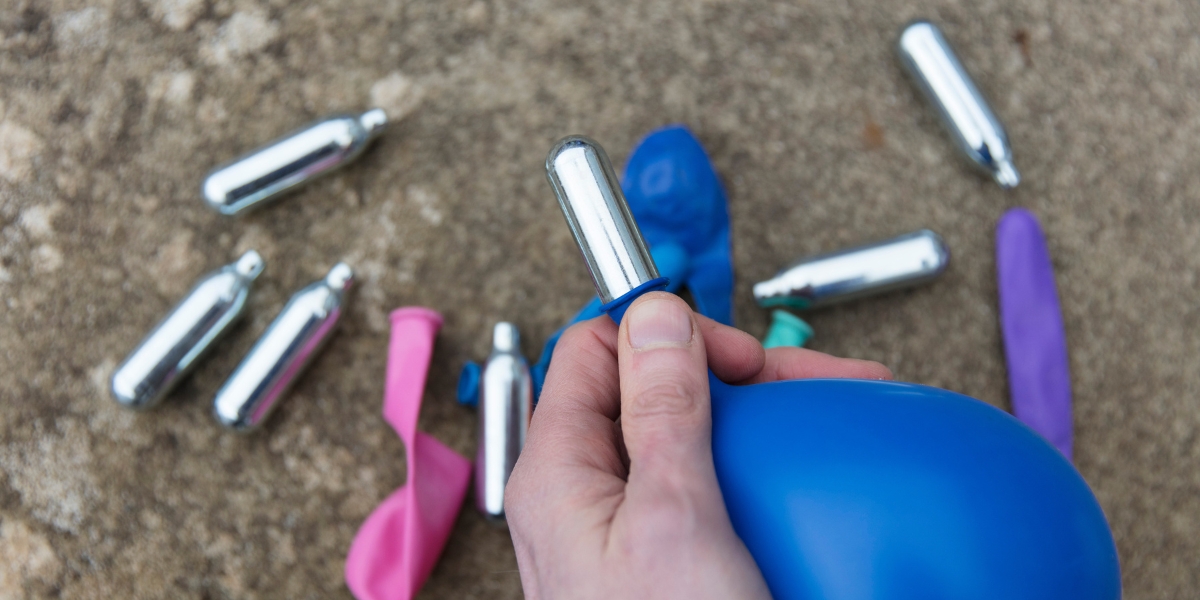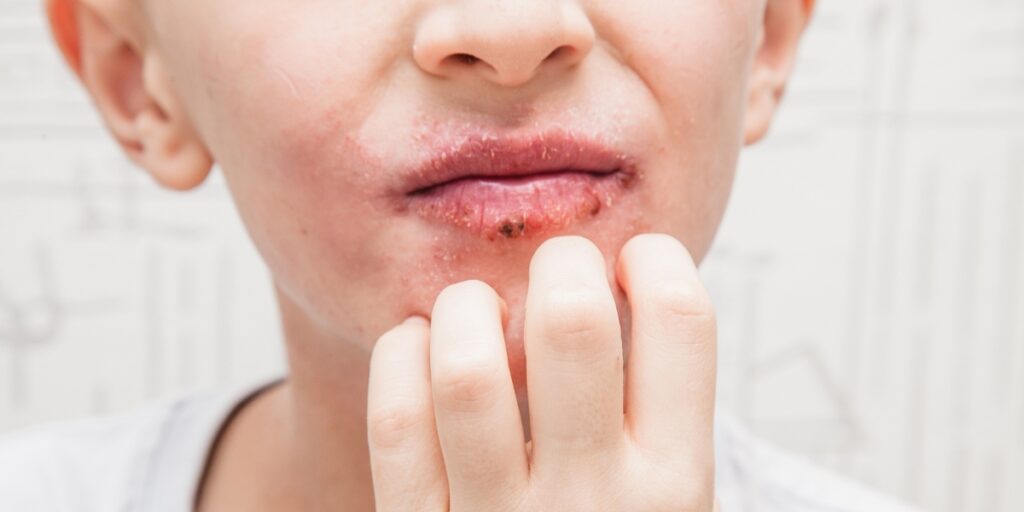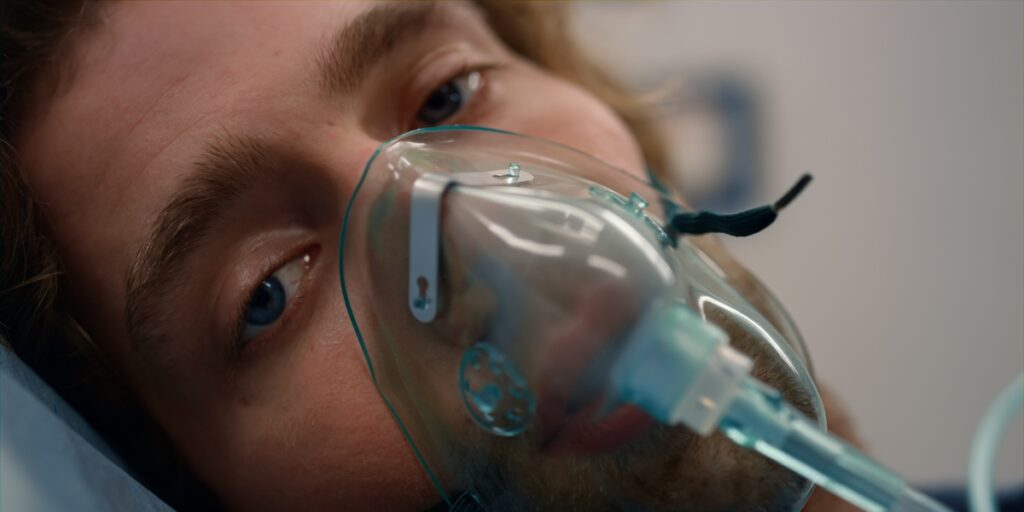Can You Overdose on Laughing Gas?

Inhaling nitrous oxide, commonly referred to as laughing gas, can lead to an overdose, brain damage, and sudden sniffing death syndrome.
In medical settings, nitrous oxide is combined with oxygen to ensure patient safety and no dangerous or lasting effects. Young people and others who abuse laughing gas as an inhalant drug consume concentrated gas with immediate and harmful effects.
What Is Laughing Gas?
Laughing gas is the slang term for nitrous oxide, a colorless and odorless gas used for pain relief during minor dental and medical procedures and found in everyday household items like cooking spray and whipped cream canisters. The term laughing gas comes from the euphoric and giddy feelings it gives users.
People who use nitrous oxide recreationally inhale laughing gas directly from canisters, called huffing, or fill balloons and take hits until it is gone. In concentrated forms, laughing gas has a slightly sweet, chemical smell.
Other slang terms for laughing gas include:
- N2O
- Hippy Crack
- Whippets or Whippits
- Nos
- Giggle gas
- Buzz bombs
- Balloons
What Does Laughing Gas Feel Like?
As the name implies, laughing gas feels like happiness and fun initially. Nitrous oxide is absorbed through the lungs, causing the effects to kick in quickly. However, the effects of laughing gas wear off as quickly as they set in, causing people to take repeated hits to sustain their high.
The desired effects of laughing gas, or nitrous oxide (N2O), include:
- Relaxation
- Euphoria
- Fits of laughter
- Sound distortion
- Hallucinations
- Moments of deep, introspective thought
- Lowered inhibitions
Laughing Gas Side Effects
Laughing gas side effects can be unpredictable and dangerous; some occur immediately, and others happen after prolonged exposure. Because it is impossible to measure how much gas a person inhales, it is difficult to predict the potential side effects and how intense they will be.
Short-term side effects of nitrous oxide abuse include:
- Headache
- Dizziness
- Cold burns on fingers, lips, inside of the mouth, throat, and lungs
- Stomach pain
- Nausea
- Vomiting
- Increased blood pressure
- Chills
- Wheezing
- Hives
- Delayed reaction time physically and mentally
- Poor judgment
- Paranoia
- Disassociation, or feeling detached from your body
- Tingling or numbness in hands, arms, legs, and feet
- Loss of consciousness

Prolonged exposure to nitrous oxide can cause severe and sometimes permanent health problems. Often, because these effects last long after the last time someone has inhaled the gas, people don’t realize they are due to long-term exposure to inhalants.
Long-term side effects of laughing gas include:
- Muscle weakness
- Vitamin B12 deficiency
- Impaired lung function
- Hypoxia, or reduced oxygen flow to the brain and internal organs
- Persistent tingling or numbness in the limbs
- Lung scarring
- Asthma
- Nerve damage
- Memory loss
- Declining motor skills
- Anemia
- Tinnitus, or a constant ringing sound
- Brain damage
People with co-occurring disorders or undiagnosed mental health problems are likelier to have a bad experience with nitrous oxide and have lasting paranoia and anxiety.
According to the Centers for Disease Control and Prevention (CDC), children and young people are more affected by the harmful effects of laughing gas due to the smaller diameter of their airways and the surface area of their lungs.
Symptoms of Nitrous Oxide Overdose
Nitrous oxide overdoses happen when someone has inhaled too much, and the body essentially shuts down. Nitrous oxide is heavier than oxygen and forces air out of the lungs when inhaled; large amounts effectively cause suffocation.
Most laughing gas overdoses are accidental overdoses because people can’t measure how much they inhale or take repeated hits to prolong their high, not giving their bodies a chance to recover from the previous amounts.
Signs of a nitrous oxide overdose include:
- Redness and irritation in the eyes, nose, and throat
- Chest pain
- Coughing
- Wheezing
- Gasping for air
- Choking
- Grasping as their chest or throat
- arm pain
- dizziness
- back pain
- Sudden nausea
- Difficulty speaking
- Extreme confusion
- Muscle weakness
- Irregular or rapid heartbeat
- Inability to stay awake
- Lips and fingers turning white or blue
- Seizures
Some symptoms of a nitrous oxide overdose are similar to a heart attack or stroke, which too much laughing gas can cause.
Mixing nitrous oxide with drugs and alcohol increases the risk of overdose and a slowed reaction time in an emergency.

Nitrous Oxide Overdose Treatment
The best treatment for a nitrous oxide overdose is immediately getting emergency help. Time is of the essence when the brain is not getting oxygen.
While you wait for emergency help to arrive, there are some things you can do to help the person overdosing, including:
- Ventilate the area to get as much oxygen as possible in the area
- Encourage them to take deep breaths of fresh air if possible
- Keep them conscious
- Position them upright or in the rescue position so they don’t fall or choke on vomit
- Do not let them eat or drink anything
- Be honest with emergency responders about any drugs or alcohol they’ve taken
In some cases of nitrous oxide overdoses, 911 operators may instruct you to do rescue breathing or CPR; you should only do this if you are familiar with the procedure and comfortable administering it. Once you begin CPR, you should not stop until medical help arrives.
When a person makes it to a hospital, they will most likely receive oxygen, and doctors will treat life-threatening symptoms. Once the person is stable, doctors will want to discuss treatment options for substance abuse and the behavioral issues created by nitrous oxide abuse to prevent future overdoses.
Treatment for Nitrous Oxide Abuse in Northridge, California
Although many consider nitrous oxide abuse a young people’s issue, its addiction can happen to anyone, especially individuals with easy access to laughing gas. If you or a loved one are struggling with inhalant abuse, compassionate help is available.
At Northridge Addiction Treatment Center, we treat the whole person, which includes using dual diagnosis to uncover underlying mental health issues that contribute to feeling the need to escape from substance abuse.
During your stay in our residential treatment center, our licensed and accredited team of addiction specialists work closely with you to explore and reframe negative emotions and thoughts into positive feelings and behaviors. Our goal is to empower you to live on your terms with healthy communication and coping skills that allow you to thrive in recovery.
Your path to a fulfilling life in meaningful recovery without drug and alcohol use is waiting for you. Reach out to start your recovery journey.
Find Meaningful Recovery
Our caring and compassionate specialists are eager to help you comfortably navigate this journey to recovery. Our individualized treatment plan, programs, and therapies may be a perfect match for you or your loved one. Let us assist you in living the happy life you deserve. It starts with a phone call.




